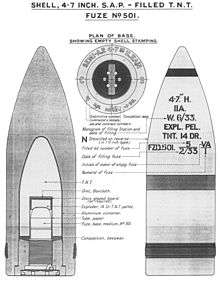BL 4.7 inch /45 naval gun
| BL 4.7 inch (120 mm) 45 calibre naval gun | |
|---|---|
|
"A" gun on destroyer HMAS Stuart, circa. 1930s | |
| Type | Naval gun |
| Service history | |
| In service | 1918–45 |
| Used by |
|
| Wars | World War I World War II |
| Production history | |
| Designed | 1917 |
| Variants | Mk I, Mk II[note 1] |
| Specifications | |
| Barrel length | 5.4 metres (213 in) bore (45 calibres) |
|
| |
| Shell | 50 pounds (22.68 kg)[1] |
| Calibre | 120 millimetres (4.724 in) |
| Muzzle velocity | 814 metres per second (2,670 ft/s)[2] |
| Maximum firing range | 14,450 metres (15,800 yd)[3] |
The BL 4.7 inch 45 calibres gun (actually a metric 120 mm gun) was a British medium-velocity naval gun introduced in 1918 for destroyers, intended to counter a new generation of heavily armed destroyers that Germany was believed to be developing.
Description and History

Mk I, of built-up wire-wound construction, went into service beginning in 1918 on destroyers of the new Admiralty type destroyer leader (Scott class) and Thornycroft type leader (Shakespeare class). Some saw service in World War I, but most entered service after the war ended.
It was also mounted on :
- Faulknor class destroyer leaders as re-gunned in 1918
- Thornycroft and Admiralty Modified W Class destroyers completed 1919 – 1920
- Prototype destroyers HMS Ambuscade and HMS Amazon commissioned 1926 & 1927
Mk II was a monobloc-barrel (i.e. single-piece, typical of small-medium World War II guns) gun of similar performance introduced in World War II to replace the worn-out Mk I guns on surviving ships.
These were the only BL-type 4.7 inch guns in British service, all others have been of the QF-type. They were superseded on new destroyers from 1930 by the 4.7 inch QF Mark IX.
Ammunition
-

Mk IIA S.A.P. (semi-armour piercing) shell, 1933
See also
Weapons of comparable role, performance and era
- Type 3 120 mm 45 caliber naval gun : Japanese equivalent
Notes
- ↑ Mk I = Mark 1, Mk II = Mark 2. Britain used Roman numerals to denote Marks (models) of ordnance until after World War II, and used separate number series for BL and QF guns of the same calibre. Hence these were the first (and only) two models of British BL 4.7-inch guns.
References
- ↑ DiGiulian
- ↑ Mk I : 814 m/s : http://navalhistory.flixco.info/H/72400x53535/8330/a0.htm
- ↑ Mk I : 14450 metres : http://navalhistory.flixco.info/H/72400x53535/8330/a0.htm
Bibliography
- Tony DiGiulian, British 4.7"/45 (12 cm) BL Mark I 4.7"/45 (12 cm) BL Mark II
External links
| Wikimedia Commons has media related to BL 4.7 inch /45 naval gun. |
